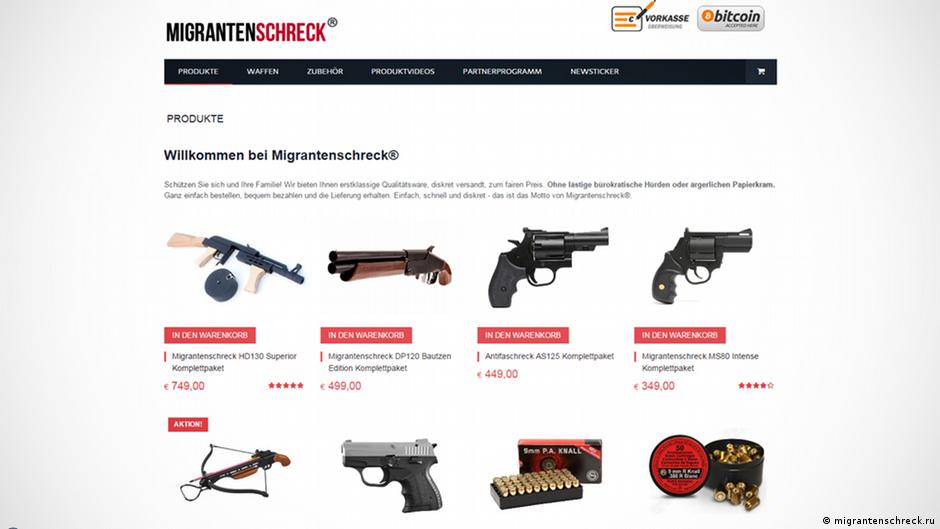MUNICH — On Oct. 5, German doctor Alexander Haase* opened his web browser and dropped merchandise he wanted to purchase into a checkout basket. He paid 590,99 euros* — money that went into a Hungarian bank account. A few weeks later, an inconspicuous brown package arrived by DHL delivery. He opened it. There was a revolver inside.
Haase has no firearms license.
The gun and bullets were delivered to his workplace, a medical practice. He voluntarily revealed his name, address, email, phone number as well as IP-address, not knowing that all this information was stored in a large database that ended up with journalists. A couple of months later, these journalists rang Haase's doorbell to ask him why he had purchased a firearm on a website called "Migrantenschreck" ("Migrants-terror").
Last year, hundreds of people in Germany purchased weapons from the website, according to a database this newspaper and technology magazine Motherboard have access to. The orders first originated in 12 countries. "Easy, fast and discreet — that's our motto," promised Migrantenschreck. While the transactions might be easy and fast, they are far from discreet. Both public prosecution departments and Federal Offices for the Protection of the Constitution have gotten hold of the client data.
The website's success shows how easy it is to make a lot of money by the rabble-rousing of right-wing extremists, how receptive the "middle-of-society" is to such purchases, and how difficult it is for authorities to clampdown on it. It takes months to build a case against sellers and customers.
For months, Haase had no idea that authorities had already linked him to the website. One January evening, two journalists stood outside the door of his medical practice. The visitors wanted to know if Haase felt he needed to protect himself from refugees.
Haase, a tall, stocky man appears to be good-natured as he offered his visitors a cup of coffee. "I don't have a problem with my need for security," he said. He's just interested in weapons. A patient told him he could buy a gun on Darknet or on the Migrantenschreck website. Haase said he feels no grudge against refugees.
Haase opened the box he received from the website to show his visitors the black revolver. He would neither shoot Germans nor refugees, he said. When shown martial product videos that are displayed on the website, he shook his head in disgust.
"Crude," he said. But at the same time he added: "Obviously, people from other countries have different ideas of how to behave in society. Uncontrolled immigration is a problem."
Haase didn't seem aggressive. Instead, he appeared insecure. He offered perspective when he felt his remarks crossed a line. He felt a "duty to help," he said. He had no idea that he was breaking the law. And yet, he does have reason to worry. Migrantenschreck shipped products that were legal in Hungary but not in Germany, where they require a permit.
SZ.de and Vice-linked website Motherboard spoke to a dozen clients of Migrantenschreck since the start of the year: men and women, young and old, professionals and graduates. They included a former policeman who ordered a replacement for his service weapon, a single mother who wants to protect her baby from refugees even though she has never had a bad experience with them.
Haase said he purchased the weapon not because of, but despite of, the website's name. Others attribute their purchase to the migrant crisis. A car mechanic from Berlin warned of the "invasion of migrants" and a "civil war." He said he "wouldn't want to kill any refugees. It's just about teaching them a lesson."
Tale of two men
Journalists came to know about these buyers because of two men — one, a petty crook, and the other, an idealist. Mario Rönsch ran "Anonymous.Kollektiv," a Facebook page that engaged in propaganda against Muslims, refugees and politicians. The page, which had almost 2 million "likes" on the social network, also advertised the illegal weapons store.
Anonymousnews.ru, the successor to Anonymous.Kollektiv, reaches hundreds of thousands of readers. Migrantenschreck shipped weapons worth hundreds of thousands of euros to buyers from the page.
Frank Schreiber* was the opposite of Rönsch. He was not interested in money and power, and worked anonymously. Without Schreiber, investigators wouldn't have anything to hold on to against Migrantenschreck. Schreiber arduously documented each and every step in Rönch's criminal career. Thousands of documents are on Schreiber's hard disk, which contains 37 gigabytes of meticulously organized material on Rönsch.
Rönsch made one big mistake that Schreiber latched on to. "Suddenly this document comes up and I can't believe my eyes," Schreiber said, recalling one night in October when he got his hands on the data of hundreds of Migrantenschreck's customers. The majority of entries correspond to real weapon purchases. Almost all the people who Motherboard and SZ.de paid a visit to bought something on Migrantenschreck.
The website said it offered fair prices for weaponry but it wasn't true. Migrantenschreck sold weapons for more than double the price it purchased them from Hungarian producer Keserű Művek. By the end of January, the store had a turnover of 150,000 euros, according to Zeit Online.
Migrantenschreck has since disappeared from the internet. Rönsch, who had operated the arms trade from Budapest, now posts pictures from holidays on the Black Sea Coast on Facebook.
*Names and details of the order have been modified.
See more from World Affairs here






